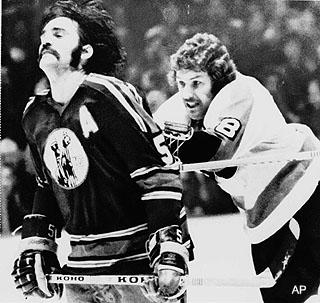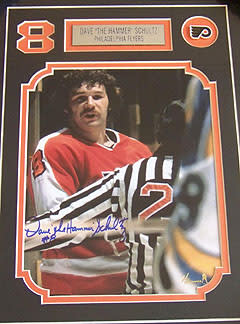Puck Daddy chats with Dave 'The Hammer' Schultz, Part 2: The Bullies, and how hockey has changed for the worse

ED NOTE: This is Part Two of our conversation with hockey fighting legend Dave "The Hammer" Schultz. Check out his new Web site.
Few men can claim to have played in The Spectrum, The Igloo and an ice rink in Abu Dhabi. Former Philadelphia Flyers winger Dave "The Hammer" Schultz is one such man.
He and some NHL alumni played in a charity game in Abu Dhabi, United Arab Emirates, which is surprisingly hockey-mad. It was a combination of ex-pats and locals in the stands, about 500 of them. "Some of the sheiks play," said Schultz, saying one opponent later walked into a bar with a Hooters T-shirt on.
Just another peculiar hockey journey for a man who's had too many to count. Like growing up idolizing the pacifist Dave Keon of the Toronto Maple Leafs, only to fight his way through the Philadelphia Flyers farm system on his way to the NHL in 1972. Like getting his name on the Stanley Cup twice with the Broad Street Bullies, after regular seasons in which he posted 348 (1973-74) and a still-NHL record 472 (1974-75) penalty minutes.
Like having played just nine NHL seasons, but having built a legacy and cult status that's last close to 30 years.
Consider this: NHL Alumni recently released a charity line of wines. Among the names involved are Gordie Howe, Pat Lafontaine, Tony Esposito and Ted Lindsay. And right next to them on the rack is Dave "The Hammer" Schultz chardonnay.
We spoke with "The Hammer" about his days as a Broad Street Bully, how fighting in the NHL has changed through the years and the possibility of his life being portrayed on film. But first ... Dave Schultz drinks Chardonnay?
I have to admit that I didn't figure you to be a Chardonnay fan.
SCHULTZ: I didn't have a choice! Although I do prefer Chardonnay to Cabernet. I'm a white wine guy.
Well, I guess they couldn't do the signature beer series. About this new Web site: What are you looking to give fans?
To give fans some information. To see some of the clips, although a lot of them are a lot of different places like YouTube. And also to promote myself: I'm in the sports memorabilia business; some of it is pretty unique, from the Cup years. And to promote public speaking events for organizations. I'm going to speak to a corporation in the waste management business in Chicago. They want a little motivation, teamwork and leadership.
There is something rather beautiful about Dave "The Hammer" Schultz telling a room full of people how to take out the trash. Anyway, your career finished up around the 1979-80 season with the Buffalo Sabres, right?
I only played 20 games with Buffalo. Scotty Bowman was there, and he sent me to the minors. He couldn't wait to send me to the minors after I kicked the crap out of a few of his Canadiens. He goes like, "There's no way in hell I'm having this guy on my team."
They sent me to Rochester, and I commuted from my home in Buffalo. I had another year on my contract, but I made a settlement with the Sabres. I could have played another year, but I retired from the game.
It was a big movement to youth. If you made $100,000 a year, they wanted a guy who made 50-60 grand a year. Again, that was around when the WHA and the NHL merged. They moved a lot of older guys out. I could have played another five years easily. None of us made a lot of money anyway.

What's remarkable about you, and some of the other tough guys from the 1970s and 80s, is that you mention the name Dave Schultz to a hockey fan and people know it; it's still endearing to new generations of hockey fans.
In the early 80s, someone said, 'Dave, in five years no one will know who you are.' It's crazy, but I was on two Stanley Cup teams. And I have the record for most penalty minutes in a season. It was another era, and it's still talked about a lot. People who never watched me play, they hear it from their fathers. And there's so many videos.
You once had 139 penalty minutes in a single postseason. A guy like Georges Laraque doesn't have that many for his postseason career. How does that happen?
Part of it is the rules changes. If you were in a playoff game, and you're losing 5-1 with three minutes to go, well what then? That's have a little fun, and set the tone for the next game. You can't do that today. Even in my day, I probably got 15 or more game misconducts, but I didn't get a suspension. Did they hand out game misconducts easier back then? Yeah. The quicker they could get some of those guys out of the game, the quicker the game would settle down.
So they're giving you the gate in the first period just to settle it all down?
There were times - and not saying I didn't deserve it - there were times when I'd go, 'What they hell, I didn't do nothing.'" And they're like, "You're outta here!"
What was Philadelphia like when the Flyers won a Stanley Cup? It's been a while.
Are the fans the same? I don't know. There are passionate fans, as there are in other cities. At the time, Philadelphia was called the city of losers. They hadn't had championships. They embraced it. It was more a blue collar town than it is today, which is normal all over the world.
Now remember: We won in '74, we won again in '75 and then went to the finals in '76. We got a lot of press, a lot of coverage. When we won that first championship, people just became hockey fans. When you have 2.2 million people come out for a parade down Broad St., then we affected the whole Delaware Valley.
I heard an interview once where you talked about [former Flyers Coach Fred Shero], and your line was that he "treated you like men," and that he "allowed you to take liberties with your leadership." What did he do to allow your locker room to gel like it did?
Any team that wins a championship, the coach knows that he has a fairly good sized group of leaders in that dressing room, and he has to let those leaders lead. That's what Fred Shero did.
When you were playing, would you talk to some of your fighting rivals during the season?
Never. Never even in the off-season. I'll give an example: After our first Cup victory, I got invited to speak at a sports banquet in Detroit, and Keith Magnusson was speaking. He wouldn't even look at me. Not like I wanted to talk to him. We had to go back at it with each other the next season. It must be difficult for guys who played junior together or in the minors, and then had to fight each other in the National Hockey League.

I've always felt that the modern game doesn't have the same level of hatred that the game had 25 years ago. Do you agree?
Yes. Passion to win, I'm sure for the most part is there. But the competitiveness and the rivalries ... there are so many more teams. And it's also become a business. It's about making money. And, again, it's not that players don't want their team do well. But they change around from team to team. It's not about loyalty to the crest on their jersey. It's about the money.
Is there anyone you respect as far as fighters today?
I watch the Flyers, so this Riley Cote is good. But it's all choreographed today. He can't go do what I did, which is go fight a guy if he took a cheap shot. It's not the players' fault; it's how the rules are.
Alright, we ask this of everyone we interview: What is your beer of choice, sir?
I don't drink beer. If I was to have a beer, I would have a Coors Light.
Favorite hockey movie other than "Slap Shot?"
Soon it's going to be my movie.
Wait, you have a movie?
My son has been working on the script for the last three years. There's a chance it could get made.
So the obvious follow-up question: Who plays Dave Schultz in a movie?
Well, it would obviously be up to the producers.
May I please make a suggestion?
Sure.
Denzel Washington.
(Laughs) Well, besides Slap Shot, I like the one in Alaska. Mystery, Alaska.
Finally, is there anything out of the ordinary you've had to sign?
Out of the ordinary ... you mean like a bra?
Yeah, that would qualify.
I've had to sign those. And I've signed many hammers, of course.

 Yahoo Sports
Yahoo Sports 

